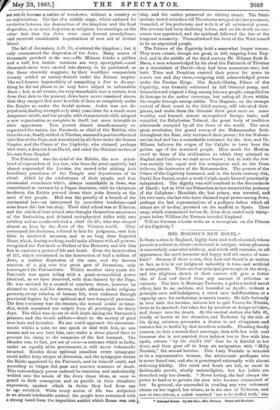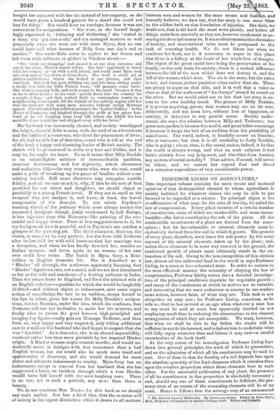MRS. NORTON'S NEW NOVEL.*
Is there a class in England, highly born and well educated, whose- pursuit is seduction, whose excitement is intrigue, whose pleasure is successfully concealed adultery, and which still contains, to all appearance, the most innocent and happy and debennaire of man- kind ? Because if there is not, then Lost and Saved is as untrue to fact, as it is in our judgment unhealthy in tone, and artificial in arrangement. There are four principal personages in the story,. and the slightest sketch of their careers will give a better idea of Lost and Saved than any amount of criticism or extracts. The hero is Montagu Treherne, a golden-haired naval officer, heir to an earldom, and beautiful as Apollo, without a principle save self-indulgence, a creed save indifferentism, or a capacity save for enchaining women's hearts. He falls furiously in love with the heroine, induces her to quit Venice for Trieste, there to be married; but takes her by accident or design to Cairo,. and thence into the desert. At the central station she falls ill, chiefly of horror at her situation, and Treherne by the side of his dying mistress, persuades a doctor to act clergyman and, restores her to health by that heartless swindle. Pleading family reasons, he first conceals their marriage, then tells her with cool baseness she is not married, then induces her to live with him again, swears "by his child's life" that he is faithful to her alone, and then goes off to keep an assignation with " Milly Nesdale," the second heroine. This Lady Nesdale is intended to be a representative woman, the aristocratic profligate who is never found out, and she is pourtrayed externally with almost sickening fidelity. Her mind and heart are left, as usual in fashionable novels, wholly unintelligible, but her habits are described only too closely. "Never loving, she had always the power to lead or to govern the men who became enamoured of her. In general, she succeeded in evading any very vehement claims on her regard, but where, as in the case of Treherne, and one or two others, a suit& resolved not to be trifled with,' she
bought her conquest with her sin instead of her coquetry, as she would have given a hundred guineas for a shawl she could not buy for thirty." She would keep no carriage, because it was not convenient for assignations. " She went, as she herself laugh- ingly expressed it, hithering and thithering ;' she rested in a shop,' she got into a cab,' and she managed matters so well (especially when she went out with Aunt Myra), that no one could have told what became of Milly hone one day's end to another." She wrote little notes in cypher to her lovers and left them with milliners, or gliders in Wardour street :—
" She went out shopping,' and passed in at one shop entrance and out at the other, Heaven knows where. She had appointed to lunch with her cousin,' or sit with a sick friend,' and ready Aunt Myra took her away and set her down at those doors. She went to study art at picture-exhibitions ; where she looked at one picture, and then vanished. She took her poor children out, and left them sitting under a shady tree with the little French bonne, till mamma came back.' She went to country balls, and took rooms in the hotel because it was so far to drive home ;' or she went quietly down into the country for a couple of days,' and then walked forth to contemplate tombs in a neighbouring churchyard, till the whistle of the railway engine told her that she need not wait many more minutes without seeing Montagu appear. She attended that political pretence, tho Ladies' Gallery' in the House of Commons, and laughed through the grille at her grave hus- band as he sat dangling some local bill, before she folded her lace mantilla closer round her and skipped away with her lover."
Her husband was incessantly cheated, and society worshipped the bright, cheerful little woman, with the soul of an adventuress and the habits of a courtesan, who lived the pleasantest of lives ; for she had no sick fear of detection,—and who is left at the end ef the book a happy and charming leader of British society. The sketch will be pronounced in clubs very true and lifelike, and it
may be, for aught we know. To us it seems that Milly Nesdale is an unintelligible mixture of irreconeileable qualities, innocent fearlessness and low depravity, adroit cleverness and audacious folly—the very woman who, were she real, would make a pride of breaking up the peace of families without com- mitting herself. Still some observers may recognize outside
fidelity, and all we care to ask is, why, if this be the sort of food provided for our wives and daughters, we should object so prudishly to a strong French novel. If they are to smell at the cesspool why not analyze it, and know, at least, the horrid components of the drau;lit. To our minds Feydeau's burning sketch of the jealousy which must always torture the successful intriguer, though justly condemned by half Europe, is less injurious than this Meissonier-like painting of the suc- cessful and happy shiner. Thera is less suggestiveness in it, for the background here is peaceful, and in Feydeau's one catches a glimpse of the yawning pit. The third character, Beatrice, the victim, is meant to be very perfect ; but she lives with Treherne after he has told her with cold baseness that her marriage was a deception, and when he has finally deserted her, marries an Italian marquis, and loves again as no woman of her cast ever could lore twice. The fourth is Myra Grey, a Briu- villiers in English domestic life. She is described as a " Hindoo " all through, the authoress apparently fancying that "Hindoo" signifies a race, not a creel, and we are first introduced to her as the wife and murderess of a doating collector in India. Then she conies home to England, and lives the admired wife of -an English solicitor—a position for which she would be laughably ill-fitted—and without object or inducement, save some vague notion of conciliating the heir to an earldom, steeps herself to the lips in crime, gives her rooms for Maly Nesdale's assigna- tions, invites Beatrice, under the idea, which she confesses, that Treherne will use tile invitation to make her his mistress, and finally tries to poison the good hero—a high-principled and haughty lsy figure—really poisons Montagu Treherne, and then lives on, very happy and very respected, only taking additional care to conciliate the husband who had begun to suspect that she was "deceitful." As a character, she is an absurd impossibility, rendered rather less than more probable by her imputed Hindoo origin. A Hindoo woman might commit murder, and would un- doubtedly assist in intrigue with less conscience than a bad English woman, but she would also be much more timid and apprehensive of discovery, and she would demand far more direct and adequate inducement to cruelty. Myra Grey has no inducement, except to conceal from her husband that she has suppressed it letter, an incident through which a true Hindoo would have lied herself with the most laughing ease. There is no true art in such a portrait, any mere than there is beauty.
We do not condemn Mrs. Norton for this book as we should any male author. She has a fixed idea, that the monster evil of society is the unjust distinction which it draws in all matters
between men and women for the same errors and frailties, and honestly believes, we dare say, that her story is one more 'blow to the edifice built on that foundation of injustice. She feels, we doubt not, that to hit hard she must write plainly, and before all things state facts precisely as they are, however unpleasant or an- noying the descrip Lion may be. It is a medical examination she makes of society, and cienventional rules must be postponed to the task . of restoring health. We do not blame her when we condemn her book, nor is it necessary to argue in this place that there is a fallacy at the basis of her whole line of thought. The object of the great social laws being the preservation of the family, as the Only basis for society, there is a radical difference between the fall of the man which does not destroy it, and the fall of the woman which does. The sin is the same, but the crime is not, and human justice punishes crime rather than sin. There are plenty to argue on that side, and it is well that a voice as clear as that of the authoress of" La Garaye" should be raised on the other. But we would point out to her that her story is un- true to her own healthy moral. The picture of Willy Nesdale, if it proves anything, proves that women may sin on for ever, deliberately, and not from love, without loss of happiness, or anxiety, or detection in any painful sense. Society under- stands, she says, the relation between Milly and Treherne; but great men pardon it because it is useful, and great ladies encourage it because it keeps the heir of an earldom from the possibility of ndsalliance. The world, indeed, is fearfully severe on Beatrice, who is innocent ; but then it is all cordiality to Lady Nesdale, who is guilty ; where, then, is the moral, unless, indeed, it be that the world is always wrong, and that on such subjects it had better abstain from any judgment, and therefore from framing any system of social morality ? That advice, if sound, will never be taken, and we cannot but regard Lost and Saved as a misspent expenditure of very considerable power.































 Previous page
Previous page